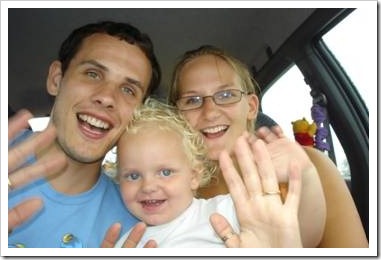
Usually, I reject the desire to be normal, because I believe we need to examine every situation separately and manage our behavior accordingly. This week, I had my beliefs questioned when I heard about a conflict between parents who are both my clients about the way to raise their 2-year-old daughter.
Damian and Alice were very successful. They were wealthy, established professionals, yet they struggled to raise their 2-year-old daughter Mel. Damian was anxious about their daughter and Alice tried very hard to reach “normality”.
At first, I thought Alice’s desire to be a normal family cluttered her perception. I did not really understand what she meant when she said, “Damian is not normal”, but the more I got to know them, the more I realized that although striving for normality may be limiting, having no sense of normality can be devastating for children. I understood that isolation and normality could not go hand in hand.
The conflict between Damian and Alice started when Mel, their first and only child, was born at a very late stage in their life. Damian was 47 and Alice as 45 when their daughter was born after 20 years of a wonderful life together. Unlike most couples, Damian (not Alice) retired from life and dedicated every possible moment to his daughter. He lost interest in friends, hobbies, his wife, his work and counted the seconds until he got back home. When he came home, Mel was on his hands and he did not leave her for a second on her own. He talked to her constantly, even when he went to the shower or the toilet. When he was home, he did not allow Alice to spend any time with Mel and insisted on being her main carer.
Alice was OK with that in the first couple of months, because she was home during the day, but when she went back to work (as the main provider), evenings became a parenting competition.
They called me when Mel threw horrible tantrums, refused to let her mom take care of her and said she only wanted Daddy. At the age of 2, she could not say a word yet and she whined and cried constantly. By that stage, I did not think it was unusual, because in many families it happens the other way – the child prefers the person who takes care of them most of the time, which is usually Mommy. This time, it was Daddy and I could understand the delay in language development because Mel grew up in a bilingual home. However, as I spent more time with them, I realized the problem was much bigger than that. Damien was so isolated in his world of joy he had no idea what to expect of Mel or how to help her develop.

Later that weekend, when Damian played with Mel on the floor, fed her and talked to her constantly without giving her a second to respond, Alice’s uncle came to her and whispered in her ears, “What’s wrong with him? Does he ever stop and let her be?”
Alice came back home and did not think much of it until one rare day when Damian could not get home in the evening and she had a chance to take care of Mel. She discovered that Mel was a wonderful girl. She played on the carpet, she did not throw any tantrums, she communicated with Alice without words and Alice’s concept of normality changed.
The following day, she noticed that when Damian was with Mel, Mel was very clingy and did not allow anyone to help her, feed her or shower her. She whined and cried constantly. When they went out to a restaurant together, she threw temper tantrums and when she spent time with Mel on her own, she was the most wonderful baby in the world. Alice started demanding to have private time with Mel, which made Damian even more anxious.
Damian said to me that he was very worried for Mel. I smiled when he said that. A first child always makes parents worry. But his worry was not normal. He did not “allow” her to be on her own for a second – not on the carpet, not in her bed, not with Alice and not with her toys. When I asked him why, he said, “She is too young!”
When he found her awake in bed, he made sounds of disaster, “Poor girl, you must be sad”, and when she cried, even if she was on Alice’s hands, he picked her up immediately and said, “Daddy will take care of you”.
When Mel had a rash and the doctor suggested them to avoid showers for a while, Damien decided they would shower her once a week. I saw them a year after the rash incident and asked them if they had seen the doctor since. They said, “No”. When I asked them if they had tried showering twice a week, they said, “No”. When I asked them how long they planned for her to shower once a week, they both looked at me puzzled.
Damian did not want their cook to come when Mel was home, saying, “There are knives on the bench top”. “What’s wrong with having knives on the bench top?” I asked, “We all use knives to cook”. He said, “Not when Mel’s around. Knives are dangerous”.
Mel could not hold a spoon, because she was “too young” to feed herself. If she played with the kitchen drawers where plastic containers are stored, he said, “It’s dangerous for a 2-year-old to play with plastic containers”. He refused to let Alice fly with Mel on her own. When Alice gave him examples of a woman he knew who had flown with her baby, he said, “You’re not Deb and Mel’s not her daughter”.
When they flew away for a vacation, he asked Alice to book a hotel that was close to a hospital and book tentative flights back home in the middle of the vacation, “In case Mel gets sick”. They never had dinner together. “Mel is intensive. When she eats, she constantly demands attention”, he said and Alice protested, “How do you explain her sitting at a restaurant with both of us?”
When they had guests while Mel was awake, Damien ignores the guests and they usually ask Alice, “Is it always like this?” When I asked Damian about it, he was surprised I said, “They don’t understand. She is just a baby”.
Isolation limits perspective

I have heard from lots of women that their husband “couldn’t change a diaper” and I knew it was part of the “I’m the more important parent” game that Damian was playing with Alice. Unlike many husbands, Alice did want to change diapers and during the first year of their daughter’s life, feeling rejected by her husband and daughter, she developed the idea that she was not normal and that something was wrong with her motherly instincts, until she saw her cousin’s daughter playing by herself.
Whenever I talked to Alice about her feelings and the way she treated Mel, she was amazing. She was very clear and allowed her to have wonderful experiences. As long as Damian was not around, she felt great being a mother. So she started changing her schedule and worked from home more to be with Mel during the day when the nanny was home. As she built her confidence as a mother (when Damian was not around) she realized that their parenting was dysfunctional and she asked my help.
When I talked to both of them, I realized that neither Damian nor Alice knew what was normal for children and what was not. Their life circumstance had made them very isolated from the world. While I was with them, I said to myself that my first nephew was a wonderful lesson in normality for me and that having an early childhood center with 1.5- to 5-year-olds had given me lots of perspective by allowing me to see a wide range of behaviors. Isolation interferes with developing perspective.
Damian was an only child who grew up with his grandparents after his dad left and his mom could not raise him for some reason and came to visit him on weekends. When I asked him if he had ever seen a 1-year-old baby before he had Mel, he thought about and said, “No, never. Mel is the only 1-year-old baby I’ve ever seen”.
I thought to myself, “Well, no wonder he’s anxious. He doesn’t know what to expect”.
Here is a list of things that isolated Damian and Alice and prevented him from developing perspective that is so important to parents.
- Having kids at a later age. By the time Mel was born, Alice and Damian’s friends already had kids who were 10-18 years old. At first, Alice and Damian spent time with their friends, but soon after, they stopped. They had no chance to learn how parents treated their kids, what was normal and what was not.
- Both Damian and Alice were “only children” and had no siblings, no nieces and no nephews to see how to behave or how their parents behaved.
- Most of the parents with kids around Mel’s age were very young and they did not feel they could relate to them, so they did not hang around them.
- They did not attend any playgroup.
- Their daughter did not go to childcare, so they could not see other kids’ (or parents’ or carers’) behavior.
- Their families lived overseas, so they had no support structure.
- They did not participate in any Internet parenting forum.
- They were both highly educated, but did not read any parenting material.

“At first she struggled, but after about 10 minutes, she was fine. She was just a normal girl”, she said. Damian said it was not easy for him, but he had never seen her so happy.
Parenting your children is (and should be) a unique experience. Doing what everyone else does is not always best, but being exposed to a variety of parenting styles and options can help greatly to fine tune your uniqueness as a parent.
Happy parenting,
Ronit











